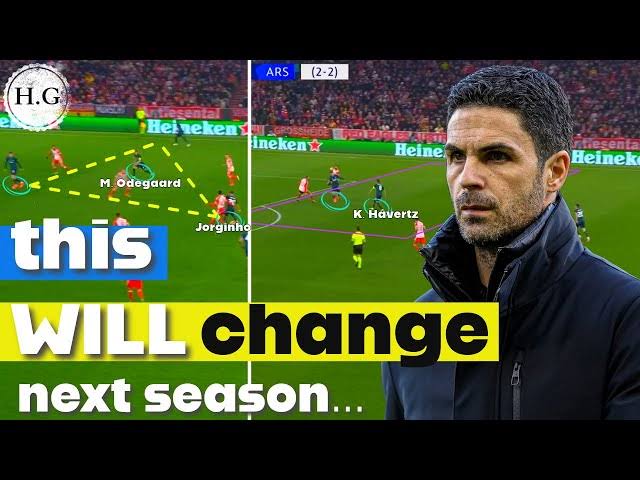This is how Mikel Arteta EVOLVES Arsenal next…Match Wil be Amazing

Mikel Arteta’s arrival at Arsenal marked the beginning of a new era. Appointed in 2019 as the club’s head coach, Arteta quickly set about implementing his vision for Arsenal, a club that had been drifting for years. One of his first moves involved an unconventional exercise to instill discipline and alertness in his squad. During a team dinner, Arteta hired professional pickpockets to subtly steal the phones and wallets of Arsenal’s players. Afterward, Arteta gathered the team and revealed the thefts, making it clear that they should always be prepared and alert, qualities he believed were essential for both football and life.
This unique exercise encapsulates Arteta’s innovative approach to management. Since his appointment, Arteta has reshaped not only Arsenal’s tactics but also its philosophy. His leadership has cultivated a culture of continuous improvement, meticulous preparation, and strategic planning that permeates the entire club
Arteta’s influence at Arsenal became even more evident after his promotion from head coach to first-team manager in August 2020. This was a crucial moment, following the departure of former director Raul Sanllehi. With his new role, Arteta gained control over the club’s football operations, and this marked a significant shift in how the club was run.
In this new leadership structure, figures like Tim Lewis and Richard Garlick rose to prominent positions within Arsenal’s hierarchy. Their roles have been crucial in aligning the club’s strategic vision with Arteta’s ambitious plans for both the first team and the wider club. The clarity and unity that have emerged from Arteta’s leadership have allowed for a more cohesive direction across all areas of the club, something that had been lacking in the years of uncertainty after Arsène Wenger’s departure.
A particularly transformative aspect of Arteta’s time at Arsenal has been his collaboration with Edu, the club’s sporting director. The partnership between Arteta and Edu has been instrumental in reshaping Arsenal’s recruitment strategy. The pair’s close working relationship ensures that all transfer decisions are made with a shared vision, extending beyond the first team to include the women’s team and the academy.
This holistic approach to club management, where all aspects of Arsenal’s footballing operations work in tandem, has been a significant departure from the more fragmented strategy of previous regimes. Arteta’s emphasis on continuity and unity has created a solid foundation for Arsenal’s long-term success.
One of Arteta’s most notable contributions to Arsenal has been his involvement in the club’s recruitment strategy. As both manager and key figure in the transfer process, Arteta has had a decisive role in shaping the squad. His approach to recruitment is driven by clarity and precision. Arteta ensures that every player brought in fits into a clearly defined role within the squad, allowing him to maintain tactical coherence while also developing the team for the future.
A standout feature of Arteta’s transfer policy has been his focus on young talent. Arteta is keen to build a squad that balances short-term needs with long-term development, and his recruitment strategy reflects this ethos. The summer of 2021 was a key moment in this shift, as Arsenal signed six players under the age of 23. This focus on youth has allowed Arteta to bring in fresh, high-potential players who can grow with the team while contributing immediately.
The addition of young players has also been a response to the changing landscape of football, where financial powerhouses dominate the market. By focusing on young talent, Arsenal can be more strategic in how they approach transfers, building a squad capable of competing at the highest level while managing their financial stability.
This emphasis on youth is not just about buying players who can develop in the future but also about fostering a sense of resilience and determination in the squad. The younger players Arteta has brought in are not just talented; they are also mentally prepared to face the challenges of playing at a top club. Players like Bukayo Saka, Emile Smith Rowe, and Gabriel Martinelli are perfect examples of this philosophy in action, all of whom have become integral members of the first team.
Arteta’s tactical evolution as a coach has been another key aspect of his tenure at Arsenal. His coaching sessions are highly structured and intense, marked by their strategic variety. Arteta has brought a sense of intensity to Arsenal’s training that was missing during the latter years of Arsène Wenger’s reign. Whereas Wenger’s later years were often characterized by a focus on free-flowing football and volume-based training, Arteta has introduced a more disciplined and methodical approach to training.
This tactical shift has paid off in the form of improved physical conditioning, sharper tactical awareness, and a competitive edge that Arsenal had been lacking in previous seasons. Arteta places a premium on precision, and this has translated into the team’s style of play. Under Arteta, Arsenal has become more organized defensively, while also incorporating a fluid, possession-based attack.
Arteta’s influence extends beyond tactics and physical training. He has also revamped Arsenal’s medical and performance departments, ensuring that the club’s support structures are aligned with his demanding training methods. This overhaul has helped to improve player fitness, reducing injuries and ensuring that players are able to reach their full potential.
Perhaps the most notable tactical innovation under Arteta has been his development of a fluid 4-3-3 formation, which has allowed Arsenal to play a more possession-based game while also being effective on the counter. Arteta’s insistence on maintaining a high press and ensuring the team is compact without the ball has made Arsenal a more difficult team to break down, a significant improvement from previous years when defensive vulnerabilities were all too apparent.
Beyond tactics and player acquisitions, one of Arteta’s most profound impacts has been on the cultural identity of Arsenal. Upon taking charge, Arteta made it clear that he wanted to reconnect the team with the club’s rich history. To do this, he introduced motivational imagery and symbols throughout the training ground and club facilities, linking the present-day team with the legacies of past legends like Arsène Wenger.
This cultural transformation has extended beyond the physical aspects of the club. Arteta has created an environment where the team’s values of discipline, commitment, and passion are ingrained in every part of the club. The competitive nature of training sessions, combined with moments designed to foster team spirit, has created a sense of unity among the players.
Arteta’s leadership has been characterized by a balance of sternness and empathy. While he demands the highest standards from his players, he also ensures that there is space for moments of shared joy and camaraderie. This has helped to cultivate a positive atmosphere within the team, which in turn has fueled its performances on the pitch.
Arteta’s ability to create this balance has been key to the team’s development. He has instilled a mindset of relentless improvement, while also ensuring that the players feel a sense of pride in representing Arsenal. This renewed sense of identity has been crucial in Arsenal’s rise back to the upper echelons of English football.
Looking to the future, Arsenal appears to be on a path toward long-term success under Arteta’s guidance. The tactical innovations he has implemented, combined with the cultural transformation within the club, have set the stage for sustained success. Arteta’s leadership style, characterized by a blend of tactical acumen, emotional intelligence, and strategic foresight, has allowed Arsenal to become a more formidable force in both domestic and European football.
As Arsenal continues to evolve under Arteta, the integration of a clear tactical strategy with a deep respect for the club’s heritage provides a blueprint for success that extends beyond the footballing aspects. This holistic approach to management ensures that Arsenal is not just focused on winning trophies but on building a club that is capable of thriving for years to come.
Under Arteta’s stewardship, Arsenal is well-positioned to reclaim its place among Europe’s elite. With a squad that is both talented and mentally prepared, a management structure that is unified, and a club culture that is rooted in the team’s rich history, Arsenal’s future looks bright. Arteta has shown that success is not just about winning matches; it is about creating a club that values discipline, unity, and continuous improvement. This vision, when fully realized, has the potential to bring Arsenal back to the top of English and European football.
In conclusion, Mikel Arteta has brought a unique combination of tactical discipline, emotional intelligence, and cultural transformation to Arsenal. His influence extends far beyond the pitch, reshaping not just the team’s style of play but also its identity. The club has become a more unified and focused entity under Arteta’s leadership, with a clear vision for the future.
As Arsenal moves forward, the lessons Arteta has instilled in his players—about alertness, readiness, and pride in the club’s history—will continue to guide the team. His tenure at Arsenal is a testament to the power of strategic thinking, cultural sensitivity, and an unwavering commitment to excellence. With Arteta at the helm, Arsenal is poised for a future full of success and continued growth.















